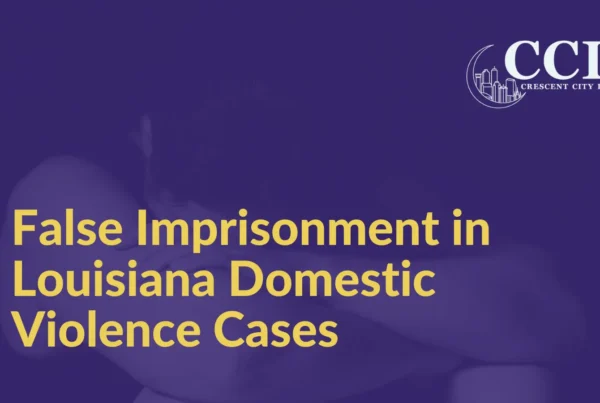If you’ve been arrested for domestic violence while already on probation in Louisiana, you’re likely feeling overwhelmed, anxious, and unsure of what comes next. It’s a deeply stressful position to be in, because now, you’re not just facing a new charge, but also risking a probation violation that could lead to serious consequences like extended supervision or even prison time.
At Crescent City Law, we understand that life is complicated and that one bad day or even one false accusation can jeopardize your future. Our team, led by experienced criminal defense attorney John Radziewicz, approaches every case with care, professionalism, and a deep understanding of the Louisiana legal system.
This blog breaks down the legal implications of a domestic violence arrest during probation in Louisiana and what steps you should take right now.
What Happens If You’re Arrested for Domestic Violence While on Probation?
When you’re on probation, you’re under court-ordered supervision, which means your behavior is closely monitored. Probation conditions typically include staying out of legal trouble and not getting arrested for something new, reporting to a probation officer, avoiding drug or alcohol use, and possibly undergoing counseling or treatment.
If you’re arrested for domestic abuse battery or any related offense while on probation, two separate, but related, legal actions can occur:
- You will face a new criminal charge under Louisiana’s domestic violence laws.
- You may be charged with violating probation, resulting in a revocation hearing.
These two cases are handled independently, but one can influence the other. You could face penalties for the new charge, your original conviction, or both. Ultimately, having a strong legal defense is crucial in every step of the legal process.
What Is Domestic Abuse Battery in Louisiana?
Under Louisiana Revised Statutes § 14:35.3, domestic abuse battery is defined as the intentional use of force or violence committed by one household member or family member upon the person of another household member or family member.
Depending on the facts of the case, this charge can be filed as a misdemeanor or a felony, especially if there are aggravating factors (e.g., strangulation, use of a weapon, or prior convictions).
If convicted, penalties may include:
- 30 days to 1 year in jail (for a first misdemeanor offense)
- Up to 3 years in prison for a felony conviction
- Mandatory domestic violence counseling
- Loss of firearm rights
What Counts as a Probation Violation?
Being arrested, whether or not you are ultimately convicted, can be enough to trigger a probation violation. The most common types of violations in this context include:
- Committing a new crime (domestic violence or otherwise)
- Failing to report the arrest to your probation officer
- Contacting the alleged victim, which may violate a protective or no-contact order
- Possession of a firearm during or after the incident
Your probation officer may issue a warrant for your arrest, or you may be summoned to court for a revocation hearing.
What Happens at a Probation Revocation Hearing?
If you’re accused of violating probation, the court will hold a revocation hearing, a legal proceeding where the judge determines whether you’ve broken the terms of your probation.
Key things to know:
- The burden of proof is lower than in a criminal trial. The prosecution only needs to show that it is “more likely than not” that you violated probation.
- You do not have the right to a jury trial, but you do have the right to legal counsel.
- If the judge finds you in violation, they may:
- Extend your probation
- Modify the terms (e.g., require more supervision or treatment)
- Revoke your probation entirely and order jail or prison time
Challenges of Facing a Domestic Violence Arrest While on Probation
Navigating a domestic violence charge is difficult on its own, but when you’re already on probation, the legal challenges become significantly more complex. The court isn’t just evaluating the new allegations; it’s also re-examining your past and your compliance with existing probation conditions.
Here are some of the most common challenges individuals face in this situation:
- Dual Legal Proceedings: You’re now dealing with two separate cases: the new domestic violence charge and the alleged probation violation. These cases may be handled by different judges or in different courtrooms but can directly impact one another.
- Lower Burden of Proof for Violations: In probation revocation hearings, the state does not need to prove your guilt beyond a reasonable doubt. Instead, the standard is “preponderance of the evidence,” meaning it’s more likely than not that you violated probation. This makes defending your case more nuanced and urgent.
- Potential for Immediate Consequences: If your probation officer files a violation report, you may be taken into custody even before a hearing takes place. You may also lose any progress toward completing probation or gaining expungement eligibility.
- Public Misperception and Stigma: Domestic violence charges carry a significant stigma, and being on probation already may cause law enforcement or the court to presume guilt prematurely. Our role is to challenge those assumptions and ensure your side of the story is heard.
- Collateral Impacts: You could face housing instability, job loss, firearm restrictions, or custody complications due to the charges. These consequences often arise before a conviction, making early legal intervention essential.
This is where having a skilled and experienced defense attorney like John Radziewicz can make a significant difference. At Crescent City Law, we understand the system from both sides and know how to push back when the odds feel stacked against you.
Contact Our Louisiana Domestic Violence Attorneys at Crescent City Law Today
Being arrested for domestic violence while on probation is a deeply serious situation, but you still have rights, and you still have options.
At Crescent City Law, our team of criminal defense attorneys is dedicated to defending individuals during their most vulnerable moments. We understand that people make mistakes, that accusations aren’t always accurate, and that everyone deserves a fair opportunity to defend themselves.
Contact us today to schedule a confidential consultation. We’re ready to listen, support, and advocate for your future.






